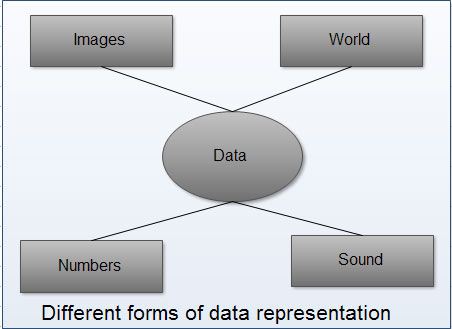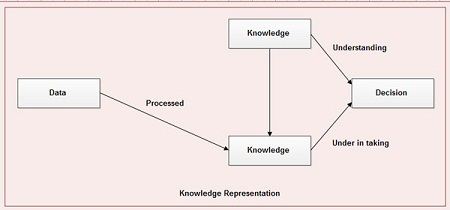The words Data and Information may look similar and many people use these words very frequently, But both have lots of differences between them.
We’ll be covering the following topics in this tutorial:
Difference between data and information
what is data: Data are plain facts. The word “data” is plural for “datum.” When data are processed, organized, structured or presented in a given context so as to make them useful, they are called Information.
It is not enough to have data (such as statistics on the economy). Data themselves are fairly useless, but when these data are interpreted and processed to determine its true meaning, they becomes useful and can be named as Information.
Information is data that has been processed in such a way as to be meaningful to the person who receives it. it is any thing that is communicated.
Data is the term, that may be new to beginners, but it is very interesting and simple to understand. It can be anything like name of a person or a place or a number etc. Data is the name given to basic facts and entities such as names and numbers. The main examples of data are weights, prices, costs, numbers of items sold, employee names, product names, addresses, tax codes, registration marks etc.
Data is the raw material that can be processed by any computing machine. Data can be represented in the form of:
Numbers and words which can be stored in computer’s language
Images, sounds, multimedia and animated data as shown.
Information: Information is data that has been converted into a more useful or intelligible form. It is the set of data that has been organized for direct utilization of mankind, as information helps human beings in their decision making process. Examples are: Time Table, Merit List, Report card, Headed tables, printed documents, pay slips, receipts, reports etc. The information is obtained by assembling items of data into a meaningful form. For example, marks obtained by students and their roll numbers form data, the report card/sheet is the .information. Other forms of information are pay-slips, schedules, reports, worksheet, bar charts, invoices and account returns etc. It may be noted that information may further be processed and/or manipulated to form knowledge. Information containing wisdom is known as knowledge.
Need of Information
Modem civilization has become so complicated and sophisticated that to survive one has to be competitive. This compels the people to keep himself informed of all types of happenings in the society. With the advent of educational reforms in society, mankind is surrounded with a vast amount of data available. Modem business management system has also rendered itself to bulk collection of data from various sources, that needs to be rearranged in a fashion so that it can be utilized with minimum possible time. This needs a high amount of filing either at data stage or at information stage. No office can be without files. If you go to any tax collection department or municipal office you will find a high amount of files stacked here and there.
Modem rules, regulation and law requires every transaction to happen in a written form, may be an agreement, application, voucher, bill, letter, memo, order etc. Paper files require a high amount of storage space and paper storage creates several other problems like fire risk, spoilage and deterioration by way of aging microorganism and humidity etc. In modem days information is needed to run man’s own livelihood to run a system or process or to command a business.
The amount of information is growing very rapidly. The current age of information demands computer literacy to be accompanied by information literacy as employers’ dependence is .now focused on professionals with up to date information and all kinds of information processing skills so as to take the challenge of ever changing scenario of information in this world information literacy helps to gather the appropriate information, evaluate the information and generate an informed decision. The impact of information revolution has been extended to each individual in the society and it is much faster than industrial revolution.
The migration from industrial age to an information age has ended the repetitive effort of workers by replacing them with computer software, robots with artificial intelligence have replaced the humans, and multiprocessing computers have replaced office workers with typewriters.
Information is needed to:
• To gain knowledge about the surroundings, and whatever is happening in the society and universe.
• To keep the system up to date.
• To know about the rules and regulations and bye laws of society, local government, provincial and central government, associations, clients etc. as ignorance is no bliss.
• Based on above three, to arrive at a particular decision for planning current and prospective actions in process of forming, running and protecting a process or system
Knowledge
Human mind purposefully organized the information and evaluate it to produce knowledge. In other words the ability of the person recalls or uses his information and experience is known as knowledge. For example, “386” is data, “your marks are 386” is information, and “It is result of your hard work” is knowledge.
The relationship between data, information and knowledge is shown.

Knowledge is of two types:
• Facts based or Information based Knowledge: The knowledge gained from fundamentals and through experiments. The knowledge is derived from the information contained in fundamental science derived from experiments, rules, regulations commonly agreed by experts.
• Heuristic Knowledge: It is knowledge of good practice, experience and good judgment like hypothesis. It is the knowledge underlying “expertise”, rules of thumb, rules of good guessing, that usually achieves desired results but do not guarantee them.
Today Knowledge Management plays a significant role in the development of an organization.
 Dinesh Thakur holds an B.C.A, MCDBA, MCSD certifications. Dinesh authors the hugely popular
Dinesh Thakur holds an B.C.A, MCDBA, MCSD certifications. Dinesh authors the hugely popular